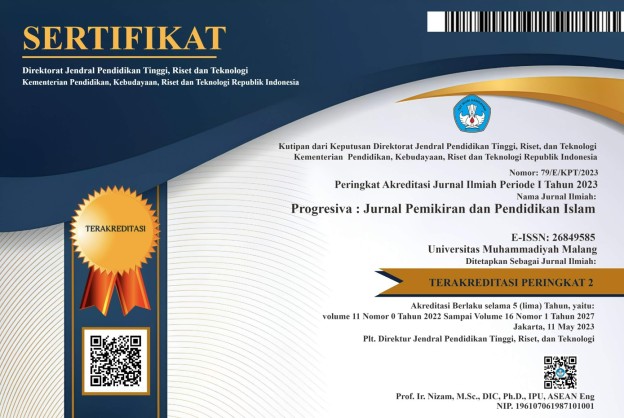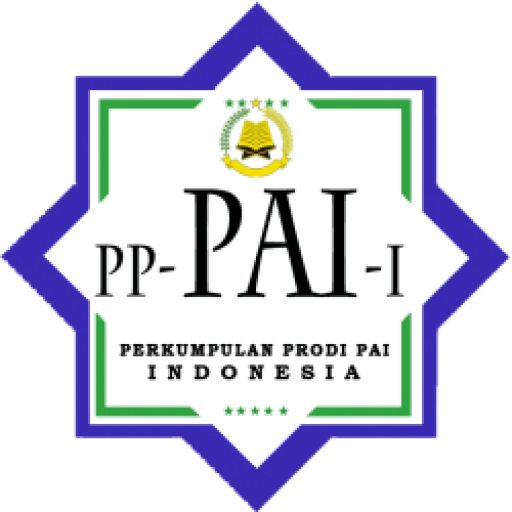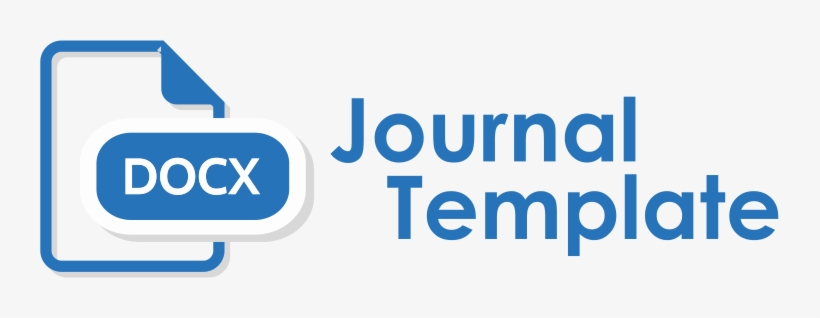The Innovation of Information and Communication Technology in Contextual Teaching and Learning Models Based PAI Learning
DOI:
https://doi.org/10.22219/progresiva.v12i02.28525Keywords:
Contextual Learning, Information and Technology, PAI LearningAbstract
The integration of technology in the era of the Fourth Industrial Revolution has become essential in various aspects of human life, including education. This study aims to explore the implementation of technology-based Islamic Religious Education learning at MAN 1 Lamongan in response to the challenges and demands of the digital era. The method used in this study involves analyzing teaching materials, interviewing Quran and Hadith teachers, and students from Madrasah Aliyah Negeri 1 Lamongan, as well as observing classroom learning. The implementation of ICT-based learning in the Contextual Learning and Teaching model consists of two stages: the design stage and the implementation stage conducted by the teachers. The implementation stage is further divided into three phases: (a) opening, which involves delivering and teaching Islamic Education knowledge materials; (b) implementation, where students engage in group projects to connect the material with real-world events and their own experiences; and (c) closing, which includes reflection and evaluation of the learning process related to the studied material. Throughout the learning process, students are given the freedom and support to utilize technology, including laptops/smartphones and software applications such as Google Chrome, Microsoft Office, YouTube, WhatsApp, and free Wi-Fi access, to facilitate their learning. The study results indicate that using ICT-based learning media for Al-qur’an Hadith in this model has successfully increased students' interest in learning, enhanced their critical thinking skills, and fostered their creative competence in understanding and processing information and knowledge collaboratively.
Downloads
References
AACTE & P21. (2013). Teachers for the 21st Century. Education, September, 22–29. http://www.oecd-ilibrary.org/education/teachers-for-the-21st-century_9789264193864-en
Adam, S., & Syastra, M. T. (2015). Pemanfaatan Media Pembelajaran Berbasis Teknologi Informasi Bagi Siswa Kelas X Sma Ananda Batam | Computer Based Information System Journal. CBIS Journal, 3(2), 1–13.
Anwar, M. S., Pramujiono, A., Astuti, S. B., & Ardianti. (2020). Pembelajaran Bahasa Indonesia untuk Generasi Milenial. Jurnal Ilmiah FENOMENA, 21(1), 56–67.
Ar Rasikh, A. R. (2019). Pembelajaran Al-Qur’an Hadits di Madrasah Ibtidaiyah: Studi Multisitus pada Madrasah Ibtidaiyah Negeri Model Sesela dan Madrasah Ibtidaiyah At Tahzib Kekait Lombok Barat. Jurnal Penelitian Keislaman, 15(1), 14–28. https://doi.org/10.20414/jpk.v15i1.1107
Aziz, A. A., & Hidayatullah, S. A. (2020). Pembelajaran Pendidikan Agama Islam di Sekolah Dasar. Taklim : Jurnal Pendidikan Agama ISlam, 18(2), 131–146.
Creswell, J., & Poth, C. (2018). Qualitative Inquiry & Research Design: Choosing Among Five Approaches (4th ed.). Sage Publications.
Dewi, S. Z., & Hilman, I. (2019). Penggunaan TIK sebagai Sumber dan Media Pembelajaran Inovatif di Sekolah Dasar. Indonesian Journal of Primary Education, 2(2), 48. https://doi.org/10.17509/ijpe.v2i2.15100
Dwi, R. P., & Estetika, R. (2019). KECAKAPAN ABAD 21: Kompetensi Digital Pendidik di Masa Depan. Jurnal Manajemen Pendidikan, 14(2), 144–151. https://doi.org/10.15330/jpnu.5.1.40-46
Faisal, S. (1990). Penelitian Kualitatif : Dasar-Dasar dan Aplikasinya. YA3.
Hidayat, T., & Syahidin, S. (2019). Inovasi Pembelajaran Pendidikan Agama Islam Melalui Model Contextual Teaching and Learning Dalam Meningkatkan Taraf Berfikir Peserta Didik. Jurnal Pendidikan Agama Islam, 16(2), 115–136. https://doi.org/10.14421/jpai.2019.162-01
Hidayati, & Musnandar, A. (2022). Implementasi Metode Pembelajaran Pendidikan Agama Islam dalam Perspektif Konsep Rahmatan Lil Alamin. DIAJAR: Jurnal Pendidikan Dan Pembelajaran, 1(3), 330–338. https://doi.org/10.54259/diajar.v1i3.982
Hilgard, E. R. (Ernest R., & Bower, G. H. (1966). Theories of learning. New York, Appleton-Century-Crofts.
Lafendry, F. (2022). Implementasi ICT dalam Proses Pembelajaran di Sekolah. Tarbawi : Jurnal Pemikiran Dan Pendidikan Islam, 5(1).
Mailani, I. (2019). Implementasi Pendekatan Kontekstual Teaching and Learning dalam Pendidikan Agama Islam. Al-Hikmah, 1(1), 15–25.
Marti’in. (2019). Analisis Tentang Rendahnya Minat Belajar Peserta Didik Kelas Xi Sma Negeri 5 Pontianak. Universitas Tanjungpura , 1–8.
Moleong, L. J. (2018a). Metodologi {Penelitian} kualitatif (Revisi). PT Remaja Rosdakarya.
Moleong, L. J. (2018b). Metodologi Penelitian kualitatif (Revisi). PT Remaja Rosdakarya.
Muhaimin, M. (2023). Wawancara dengan Peserta Didik Kelas XI MAN 1 Lamongan.
Ningsih, K., Yuniarti, A., & T, A. Y. (2023). META-ANALYSIS OF THE EFFECT OF ICT-BASED LEARNING MEDIA ON STUDENTS’ BIOLOGY LEARNING OUTCOMES. 8(1), 98–102.
Rahmadani. (2019). Lantanida Journal,. Lantanida Journal, 7(1), 1–15.
Republik Indonesia, P. (2007). Peraturan Pemerintah Republik Indonesia Nomor 55 Tentang Pendidikan Agama Dan Pendidikan Keagamaan. Republik Indonesia.
Romlah. (2011). Implementasi Model Pembelajaran Pendidikan Agama Islam Dengan Pendekatan Kontekstual Sebagai Upaya Meningkatkan Kualitas Pembelajaran di SMPN 13 Kota Malang. Jurnal PROGRESIVA, 5(1), 13–28.
Rosdiana. (2018). Penggunaan Media Pembelajaran Berbasis ICT dan Pengaruhnya Terhadap Tingkat Kelulusan Ujian Nasional Siswa Pada Sekolah Menengah Di Kota Palopo (Studi Kasus Di 5 Sekolah Menengah Di Kota Palopo). Al-Khwarizmi: Jurnal Pendidikan Matematika Dan Ilmu Pengetahuan Alam, 4(1), 73–82. https://doi.org/10.24256/jpmipa.v4i1.253
Sabiri, K. A. (2020). ICT in EFL teaching and learning: A systematic literature review. Contemporary Educational Technology, 11(2), 177–195. https://doi.org/10.30935/cet.665350
Sofwan, N. M., & Supriadi, U. (2014). Pembelajaran PAI Berbasis Media Digital (Studi Deskriptip terhadap Pembelajaran PAI di SMA Alfa Centauri Bandung). TA’LIM : Jurnal Pendidikan Agama Islam, 12(1), 55–67.
Toha, M. (2023). Wawancara Guru Al-qur’an Hadith MAN 1 Lamongan.
Wahid, L. A., & Hamami, T. (2021). Tantangan Pengembangan Kurikulum Pendidikan Islam dan Strategi Pengembangannya dalam Menghadapi Tuntutan Kompetensi Masa Depan. J-PAI: Jurnal Pendidikan Agama Islam, 8(1), 23–36. https://doi.org/10.18860/jpai.v8i1.15222
Wangge, M. (2020). Implementasi Media Pembelajaran Berbasis ICT dalam Proses Pembelajaran Matematika di Sekolah Menengah. Fraktal: Jurnal Matematika Dan Pendidikan Matematika, 1(1), 31–38. https://doi.org/10.35508/fractal.v1i1.2793
Widianto, E., Anisnai’l Husna, A., & Nur Sasami, A. (2021). Pemanfaatan Media Pembelajaran Berbasis Teknologi Informasi. Journal of Education and Teaching, 2(2), 213–224. https://doi.org/10.24014/jete.v2i2.11707
Downloads
Published
How to Cite
Issue
Section
License
Copyright (c) 2023 Luqman Hakim, Anfasa Naufal Reza Irsali; Tsamarah Nabilatul Watsiqoh

This work is licensed under a Creative Commons Attribution-ShareAlike 4.0 International License.


















